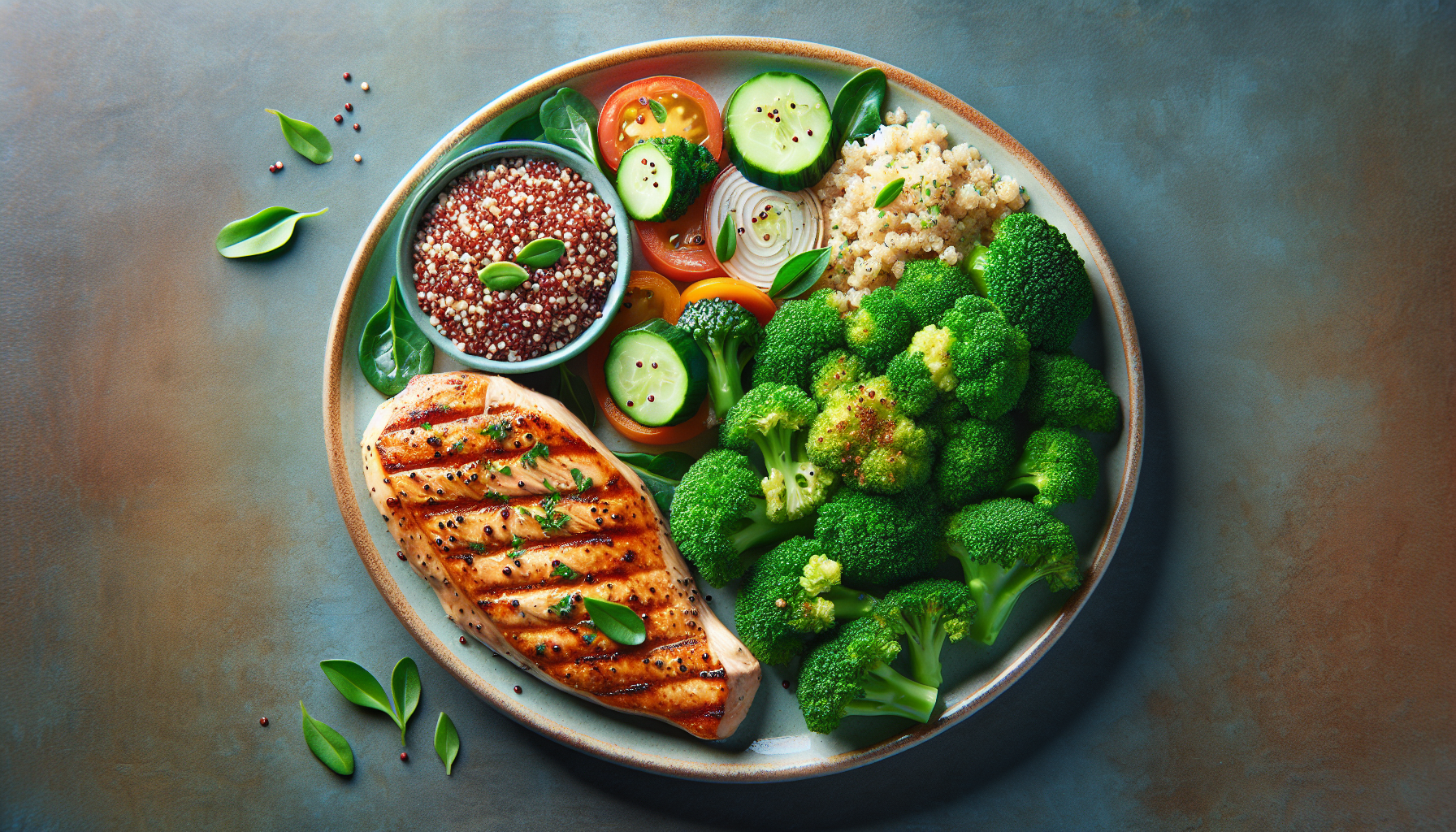Looking to shed some pounds in a healthy and sustainable way? Look no further than Weight Watchers and their point-based diet. With this approach, you can still enjoy your favorite foods while keeping track of your portion sizes. In this article, we’ll delve into the details of this popular diet, including its benefits, potential challenges, and any specific variations that are relevant. We’ll also provide suggestions for delicious recipes and typical meals associated with the program. Remember, though, it’s crucial to consult a qualified health professional before embarking on any diet, as personalized guidance is essential to ensuring the diet fits your individual health needs and conditions. Experience the freedom and flexibility of the Weight Watchers point-based diet today!

Discover the Ultimate Weight Loss Secrets Here!
What is the Weight Watchers (Point-Based Diet)?
The Weight Watchers (Point-Based Diet) is a popular and effective weight loss program that uses a points system to help individuals make healthier food choices. This diet aims to assign a point value to each food based on its nutritional content, thereby encouraging individuals to make choices that will help them achieve their weight loss goals.
How Does the Point System Work?
Assigning points to foods
In the Weight Watchers (Point-Based Diet), each food is assigned a point value based on its calorie, protein, sugar, and saturated fat content. This point value is determined using a calculation that takes these factors into account. Foods that are higher in calories, saturated fat, and sugar will have a higher point value, while foods that are lower in these factors will have a lower point value.
Daily and weekly point allowances
Individuals following the Weight Watchers (Point-Based Diet) are assigned a specific number of daily points based on their weight, age, height, and gender. Additionally, there is a weekly allowance of “flex points” that can be used for indulgences or special occasions. This system allows for flexibility and encourages individuals to make mindful choices within their allotted points.
Tracking points
To successfully follow the Weight Watchers (Point-Based Diet), it is crucial to track the points of each food consumed throughout the day. This can be done through various methods, such as through the Weight Watchers app or by keeping a manual food diary. Tracking points helps individuals stay accountable and mindful of their eating habits, making it easier to identify areas for improvement and make adjustments as needed.

Click Here for Proven Fat-Burning Strategies!
Benefits of the Weight Watchers (Point-Based Diet)
Effective weight loss
One of the biggest benefits of the Weight Watchers (Point-Based Diet) is its effectiveness in promoting weight loss. By assigning point values to foods and encouraging portion control, individuals can create a calorie deficit that leads to weight loss over time. The structure of the diet helps individuals develop healthier eating habits while still enjoying a wide variety of foods.
Promotes healthy eating habits
The Weight Watchers (Point-Based Diet) not only focuses on weight loss but also on promoting overall health. By assigning higher point values to foods that are high in calories, saturated fat, and sugar, and lower point values to nutrient-dense foods, the diet encourages individuals to make healthier food choices. This emphasis on balanced nutrition can lead to long-term changes in eating habits and improved overall health.
Flexible and customizable
One of the key advantages of the Weight Watchers (Point-Based Diet) is its flexibility. Unlike restrictive diets that limit food choices, this diet allows individuals to enjoy a wide variety of foods while still staying within their daily and weekly point allowances. It can be adapted to accommodate different dietary preferences and restrictions, making it suitable for people with various eating styles.
Encourages exercise
The Weight Watchers (Point-Based Diet) also emphasizes the importance of regular physical activity for weight loss and overall well-being. The program encourages individuals to earn activity points by engaging in exercise and incorporates these points into the overall point system. This integration of exercise helps individuals establish a more balanced and holistic approach to weight loss and overall health.
Challenges of the Weight Watchers (Point-Based Diet)
Requires tracking and monitoring
One of the main challenges of the Weight Watchers (Point-Based Diet) is the requirement to track and monitor food intake. This can be time-consuming, especially at the beginning when individuals need to familiarize themselves with the point values of different foods. However, once individuals become more accustomed to the diet, tracking becomes easier and more efficient.
Can be time-consuming
Following the Weight Watchers (Point-Based Diet) may require additional time for meal planning, food preparation, and tracking points. It involves being mindful of portion sizes, reading food labels, and calculating point values for homemade meals. While this extra effort can be initially overwhelming, it becomes easier with practice and can ultimately foster a greater understanding and awareness of nutrition.
May rely heavily on processed foods
While the Weight Watchers (Point-Based Diet) promotes healthy eating habits, some individuals may find themselves relying heavily on processed foods that are labeled with point values. While these foods can be convenient and fit within the point system, it is important to prioritize whole, nutrient-dense foods as much as possible. Incorporating fresh fruits, vegetables, lean proteins, and whole grains into the diet can significantly enhance its health benefits.

Variations of the Weight Watchers (Point-Based Diet)
WW Freestyle
WW Freestyle is the latest variation of the Weight Watchers (Point-Based Diet) and offers the greatest flexibility. It assigns zero points to over 200 foods, including fruits, vegetables, lean proteins, and whole grains, allowing individuals to enjoy these foods without tracking them. This variation encourages individuals to focus on these zero-point foods while still tracking and assigning points to other foods.
WW Flex
WW Flex is another version of the Weight Watchers (Point-Based Diet) that assigns points to foods based on their nutritional content. This variation offers a higher point allowance compared to previous versions, allowing individuals to enjoy a larger variety of foods while staying within their daily and weekly point targets.
WW Green, Blue, and Purple Plans
The Weight Watchers program also offers color-based plans, known as WW Green, Blue, and Purple Plans. Each plan assigns a different number of daily and weekly points based on the individual’s goals and preferences. The Green Plan offers the highest number of daily points and the most structured tracking approach, while the Blue and Purple Plans offer varying degrees of flexibility and zero-point foods.
Recipe Suggestions for the Weight Watchers (Point-Based Diet)
Breakfast ideas
- Egg white omelette with spinach, mushrooms, and tomatoes
- Greek yogurt bowl with fresh berries and a sprinkle of granola
- Whole-grain toast topped with avocado and sliced hard-boiled eggs
Lunch and dinner options
- Grilled chicken breast with roasted vegetables and quinoa
- Shrimp stir-fry with a variety of colorful vegetables and brown rice
- Baked salmon with steamed asparagus and a side of sweet potato mash
Snack ideas
- Apple slices with a tablespoon of almond butter
- Carrot sticks with a low-fat Greek yogurt dip
- Air-popped popcorn sprinkled with nutritional yeast for a cheesy flavor
Dessert recipes
- Mixed berry crumble made with oatmeal and a touch of honey
- Banana “nice cream” made by blending frozen bananas with a splash of almond milk
- Dark chocolate-dipped strawberries for a guilt-free indulgence
Importance of Consulting a Qualified Health Professional
While the Weight Watchers (Point-Based Diet) can be an effective weight loss and healthy eating program for many individuals, it is crucial to consult a qualified health professional before starting any dietary changes. A personalized consultation with a nutritionist or doctor can ensure that the diet is suitable for your individual health needs and conditions. They can provide valuable guidance, monitor your progress, and help tailor the program to your specific goals and requirements. Remember, the road to a healthier lifestyle is best taken with the support and expertise of a qualified professional.

